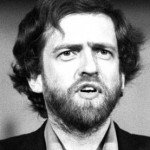 Jeremy Corbyn (1949- ) is a long serving British politician, currently the leader of the Labour Party and Leader of the Opposition. He was a controversial figure during the 1980s due to his support for Irish Republicanism and radical left wing causes. Corbyn was born in Chippenham, Wiltshire, the son of an engineer and a school teacher. Corbyn joined the Labour Party Young Socialists while studying at Adams’ Grammar School. He also joined animal welfare groups and became a vegetarian at age 15. Corbyn did not attend university, choosing instead to do voluntary work in Jamaica. On his return to Britain in 1971 he became a union official and organiser. He also assisted the Labour Party with its publications and campaigns. In June 1983 Corbyn was elected to the House of Commons, representing the seat of Islington North. He became a prominent member of the Labour Party’s left wing, praising socialist policies abroad, criticising Israeli military action, condemning apartheid in South Africa and speaking in support of gay rights.
Jeremy Corbyn (1949- ) is a long serving British politician, currently the leader of the Labour Party and Leader of the Opposition. He was a controversial figure during the 1980s due to his support for Irish Republicanism and radical left wing causes. Corbyn was born in Chippenham, Wiltshire, the son of an engineer and a school teacher. Corbyn joined the Labour Party Young Socialists while studying at Adams’ Grammar School. He also joined animal welfare groups and became a vegetarian at age 15. Corbyn did not attend university, choosing instead to do voluntary work in Jamaica. On his return to Britain in 1971 he became a union official and organiser. He also assisted the Labour Party with its publications and campaigns. In June 1983 Corbyn was elected to the House of Commons, representing the seat of Islington North. He became a prominent member of the Labour Party’s left wing, praising socialist policies abroad, criticising Israeli military action, condemning apartheid in South Africa and speaking in support of gay rights.
Corbyn’s views on Northern Ireland and the Troubles were controversial for a British Member of Parliament. Corbyn advocated the reunification of Ireland, supported Sinn Fein and campaigned for the release of the Guildford Four and Birmingham Six. In October 1984, just two weeks after the Brighton Hotel bombing, Corbyn invited Linda Quigley and Gerard McLoughlin, two Irish Republicans convicted of terrorism related offences, into the House of Commons. He was censured by his party but later invited Gerry Adams into the Parliament. Corbyn voted against the 1985 Anglo-Irish Agreement, telling parliament that it “strengthens rather than weakens the border… and those of us who wish to see a United Ireland oppose the agreement for that reason”. In May 1987 British commandos ambushed a Provisional IRA squad in Loughgall, County Armagh, killing eight volunteers and one civilian. Corbyn courted controversy by observing a minute’s silence for the dead men, ostensibly a protest against what he considered a summary execution. Later in 1987 Corbyn hired Ronan Bennett, a Republican novelist accused of murder and bomb plots, as a parliamentary researcher.
Corbyn’s support for radical Republicans set him at odds with most of his parliamentary colleagues. Conservative MPs and some of Corbyn’s Labour colleagues criticised him in public and shunned him in private. The British press condemned Corbyn as a dangerous or foolish radical, while the intelligence agency MI5 monitored his interactions with Sinn Fein and other Irish Republicans. Corbyn supported the Good Friday Agreement but was otherwise a thorn in the side of Tony Blair‘s government, voting against it hundreds of times on issues such as the 2003 invasion of Iraq. In September 2015 Corbyn was elected leader of the Labour Party, a position he continues to hold today.
© Alpha History 2017. Content on this page may not be republished or distributed without permission. For more information please refer to our Terms of Use.
This page was written by Jennifer Llewellyn and Steve Thompson. To reference this page, use the following citation:
J. Llewellyn & S. Thompson, “Jeremy Corbyn”, Alpha History, accessed [today’s date], https://alphahistory.com/northernireland/jeremy-corbyn/.
